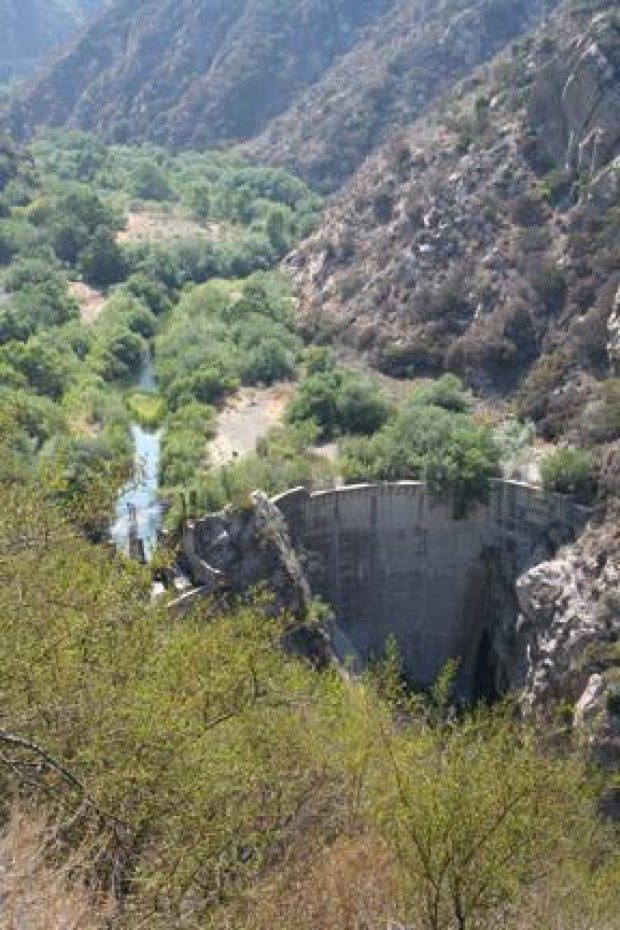The Rindge Dam, a dangerous hiking destination recently popular amongst thrill-seeking visitors, is closing to the public on Thursday.
Located in Malibu Creek State Park, the dam was built by Malibu’s historic Rindge family to provide agricultural water supply in the 1920s. In recent years, it has become a destination for teenage daredevils and vandals who, according to State Parks officials often make the treacherous hike to the dam in order to drink, dive into the creek and paint the dam’s walls.
In a conversation with The Malibu Times on Tuesday, State Parks spokesperson Craig Sap said that vandalism has continued right up until recent days.
“Two nights ago, visitors happened to be over in that area and witnessed a couple of individuals using paint rollers and using paint on the dam itself,” Sap said, adding, “We arrested two or three individuals for felony vandalism.”
Sap also credited the dawn of the social media age for the dam’s newfound popularity.
“Documenting themselves jumping off the dam is in large part why we have a huge increase in activity,” said Sap.
According to information released by the California State Parks, public safety is a primary concern when it comes to justifying the dam’s closure.
“Rescuers responding to this area face challenging obstacles which limit that amount of emergency equipment they can bring to injured persons. Similarly, the response times are extremely delayed due to the terrain,” reads the release.
An injured hiker was pulled out of the area in November of last year after falling 200 feet while attempting to access the dam. According to reports by Malibu Search and Rescue, rescue officials had to use a helicopter and a winch system to extract the man from the park because of dangerous terrain.
“The Rindge Dam has been the site of numerous rescues of stranded and injured hikers seeking out its water features,” the SAR team said on its Facebook page at the time.
The closure of the dam is also touted as an environmentally responsible move by Parks officials, who mentioned that conditions around the dam have become filthy.
“Sanitation conditions down there have been reported to be abysmal, not just the trash but also the human waste down there,” said Sap.
Sap also mentioned that steelhead trout, a fish species native to Malibu Creek, would benefit from limiting access to the dam.
“That will have a positive effect on the … fish community,” said Sap.
For years, the State has been pushing to tear down Rindge Dam, which is said to have a negative impact on the steelhead trout’s migration up and down Malibu Creek and may prevent spawning. Opponents, however, argue the project could cost up to $100 million and be a waste of state resources for a small population of fish. Residents of Serra Retreat also worry its removal could unleash tons of dirt and sediment that has built up behind the dam.
But Sap made it clear that the current closure of the dam was not influenced by those efforts, but instead by the recent uptick in popularity.
“The issue we’re talking about now in regards to the public safety issue, as well as the environmental issues, is really something that’s been borne out of the last 18 months,” said Sap.
Parks officials plan to post signs around the areas where the use trails begin, off Malibu Canyon Road. Because access to the trails requires a walk down Malibu Canyon Road from the Piuma parking lot, rangers will be able to warn potential visitors that access is no longer permitted before they begin to hike.
“[Rangers will] know where they’re going and they’ll be able to stop them that way, and say, ‘don’t go down there, it’s closed,’” said Sap.
Because access will not be physically blocked with fences or other obstacles, it is still considered likely that some visitors will choose to hike down to the dam.
“Obviously, there’s going to be some individuals who feel that it’s worth the risk,” said Sap, “in which case, if we contact them and they go down there, there can be a citation or even arrest.”
“Even if we do catch them down there, the rangers can just get their information and kick them out,” Sap added, “We’re not penalizing people, just trying to keep that area safe.”

